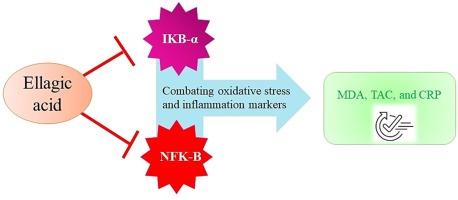补充鞣花酸对氧化应激、抗氧化能力和炎症生物标志物的影响:随机对照试验的系统回顾和剂量反应荟萃分析
IF 3.8
2区 农林科学
Q2 FOOD SCIENCE & TECHNOLOGY
引用次数: 0
摘要
背景鞣花酸在预防和管理氧化应激和炎症指标方面具有潜力;但是,补充鞣花酸的效果、最佳剂量和时间仍不确定。本研究旨在评估补充鞣花酸对氧化应激和炎症指标(如丙二醛 (MDA)、总抗氧化能力 (TAC) 和 C 反应蛋白 (CRP) )的影响。数据来源对数据库(PubMed、ISI Web of Science 和 Scopus)进行系统检索,确定了截至 2024 年 3 月的相关研究。研究资格标准符合资格的研究必须符合标准,包括特定的研究设计(随机对照临床试验 (RCT) 或准实验)、对照组和干预组之间鞣花酸效果的比较,以及鞣花酸对氧化应激和炎症指标影响的可用数据。数据提取两位独立审稿人收集了相关信息,如鞣花酸干预措施的具体内容、研究特点、研究方法、参与者属性、干预措施的具体内容、评估结果,以及与本研究中探讨的结果相关的发现。数据分析对 5 项符合条件的研究数据进行了分析,共有 240 人参与了 MDA 水平的研究,171 人参与了 TAC 水平的研究,142 人参与了 CRP 水平的研究。使用随机效应模型对 5 项研究进行的 6 次比较结果显示,补充鞣花酸可显著降低 MDA 水平(加权平均差 (WMD):-0.631 µM/L):-0.631微摩尔/升,95%置信区间(CI):-1.009, -0.254; p: 0.001).此外,来自 4 项研究 5 个治疗组的汇总数据显示,补充鞣花酸可显著提高 TAC 水平(WMD:0.743 mg/dL,95 % 置信区间(CI):0.141,1.345;p:0.016)。对涉及 142 人的 3 项试验进行分析后发现,补充鞣花酸可显著降低 CRP 水平 3.00 ng/ml(95 % CI:-4.046,-1.954;p <;0.001)。鞣花酸补充剂剂量为 180 毫克/天和 200 毫克/天时,TAC 水平明显升高,在为期 8 周的干预研究中,TAC 有明显提高,但在为期 12 周的干预研究中,TAC 没有明显提高(P > 0.05)。TAC水平的变化与剂量之间没有明显的相关性(P,0.06),但鞣花酸补充剂的持续时间与TAC水平的变化有明显的相关性。结论在较短的干预期内补充较高剂量(180 或 200 毫克/天)的鞣花酸会对氧化应激和炎症产生积极影响。鉴于在这一领域开展的研究数量有限,现有的证据不足以支持研究结果,需要进行更多的试验来进一步调查和澄清这种关联。本文章由计算机程序翻译,如有差异,请以英文原文为准。

Ellagic acid supplementation on oxidative stress, antioxidative capacity and inflammation biomarkers: A systematic review and dose–response meta-analysis of randomized controlled trials
Context
Ellagic acid demonstrates potential in the prevention and management of oxidative stress and inflammation markers; however, the effects of supplementation, optimal dosage, and timing are still uncertain.
Objective
This study aimed to assess the effects of ellagic acid supplementation on oxidative stress and inflammation markers such as malondialdehyde (MDA), total antioxidant capacity (TAC), and C-reactive protein (CRP).
Data Sources
A systematic search of databases (PubMed, ISI Web of Science, and Scopus) identified relevant studies until March 2024.
Study Eligibility Criteria
Eligible studies had to meet criteria including specific study designs (Randomized controlled clinical trials (RCT) or quasi-experimental), comparison of ellagic acid effects between control and intervention groups, and availability of data on ellagic acid’s impact on oxidative stress and inflammation markers. Outcome measures focused on markers of oxidative stress and inflammation such as MDA,TAC and CRP.
Data Extraction
Two independent reviewers collected information, such as specifics of ellagic acid intervention, study features, study methodology, participant attributes, intervention specifics, evaluated outcomes, and findings linked to the outcomes explored in the present study.
Data Analysis
Data from 5 eligible studies were analyzed, encompassing a total of 240 individuals for MDA levels, 171 participants for TAC levels, and 142 individuals for CRP levels. The results from six comparisons across five studies using a random-effects model showed that ellagic acid supplementation significantly reduced MDA levels (Weighted mean difference (WMD): −0.631 µM/L, 95 % confidence interval (CI): −1.009, −0.254; p: 0.001). Additionally, pooled data from 4 studies with 5 treatment arms indicated a significant increase in TAC levels with ellagic acid supplementation (WMD: 0.743 mg/dL, 95 % CI: 0.141, 1.345; p: 0.016). Analysis of 3 trials involving 142 individuals revealed a significant decrease in CRP levels by 3.00 ng/ml (95 % CI: −4.046, −1.954; p < 0.001) with ellagic acid supplementation. TAC levels significantly increased in individuals taking ellagic acid supplements at doses of 180 and 200 mg/day, with a meaningful enhancement in TAC in studies with an 8-week intervention but not in those lasting 12 weeks (P > 0.05). There was no significant correlation between changes in TAC levels and dosage (P, 0.06), but a significant association was found between the duration of ellagic acid supplementation. One of the basic limitations of this study is the scarcity of prior research, making the findings more of a summary and hypothesis generator for future studies.
Conclusions
Supplementation with ellagic acid demonstrates positive impacts on oxidative stress and inflammation when administered at higher doses (180 or 200 mg/day) over a shorter intervention period. Given the limited number of studies conducted in this area, the available evidence to support the findings is insufficient and additional trials are needed to further investigate and clarify this association.
求助全文
通过发布文献求助,成功后即可免费获取论文全文。
去求助
来源期刊

Journal of Functional Foods
FOOD SCIENCE & TECHNOLOGY-
CiteScore
9.60
自引率
1.80%
发文量
428
审稿时长
76 days
期刊介绍:
Journal of Functional Foods continues with the same aims and scope, editorial team, submission system and rigorous peer review. We give authors the possibility to publish their top-quality papers in a well-established leading journal in the food and nutrition fields. The Journal will keep its rigorous criteria to screen high impact research addressing relevant scientific topics and performed by sound methodologies.
The Journal of Functional Foods aims to bring together the results of fundamental and applied research into healthy foods and biologically active food ingredients.
The Journal is centered in the specific area at the boundaries among food technology, nutrition and health welcoming papers having a good interdisciplinary approach. The Journal will cover the fields of plant bioactives; dietary fibre, probiotics; functional lipids; bioactive peptides; vitamins, minerals and botanicals and other dietary supplements. Nutritional and technological aspects related to the development of functional foods and beverages are of core interest to the journal. Experimental works dealing with food digestion, bioavailability of food bioactives and on the mechanisms by which foods and their components are able to modulate physiological parameters connected with disease prevention are of particular interest as well as those dealing with personalized nutrition and nutritional needs in pathological subjects.
 求助内容:
求助内容: 应助结果提醒方式:
应助结果提醒方式:


